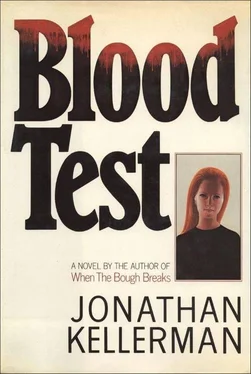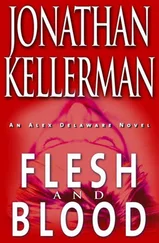Jonathan Kellerman - Blood Test
Здесь есть возможность читать онлайн «Jonathan Kellerman - Blood Test» весь текст электронной книги совершенно бесплатно (целиком полную версию без сокращений). В некоторых случаях можно слушать аудио, скачать через торрент в формате fb2 и присутствует краткое содержание. Город: New York, Год выпуска: 1986, ISBN: 1986, Издательство: Atheneum, Жанр: Триллер, на английском языке. Описание произведения, (предисловие) а так же отзывы посетителей доступны на портале библиотеки ЛибКат.
- Название:Blood Test
- Автор:
- Издательство:Atheneum
- Жанр:
- Год:1986
- Город:New York
- ISBN:978-0689116346
- Рейтинг книги:4 / 5. Голосов: 1
-
Избранное:Добавить в избранное
- Отзывы:
-
Ваша оценка:
- 80
- 1
- 2
- 3
- 4
- 5
Blood Test: краткое содержание, описание и аннотация
Предлагаем к чтению аннотацию, описание, краткое содержание или предисловие (зависит от того, что написал сам автор книги «Blood Test»). Если вы не нашли необходимую информацию о книге — напишите в комментариях, мы постараемся отыскать её.
Blood Test — читать онлайн бесплатно полную книгу (весь текст) целиком
Ниже представлен текст книги, разбитый по страницам. Система сохранения места последней прочитанной страницы, позволяет с удобством читать онлайн бесплатно книгу «Blood Test», без необходимости каждый раз заново искать на чём Вы остановились. Поставьте закладку, и сможете в любой момент перейти на страницу, на которой закончили чтение.
Интервал:
Закладка:
The food came. He put two rolls on his plate, cut them into tiny chunks, and systematically popped each piece in his mouth, finishing all of it before I’d downed half my bagel. The waitress poured coffee, which was inspected, creamed, stirred, and quickly swallowed. He dabbed his lips and picked imaginary crumbs out of his mustache.
“Notice that I used the word curable. No timid talk of extended remission. We’ve beaten Wilm’s Tumor, we’ve beaten Hodgkin’s disease. Non-Hodgkin’s lymphoma is next. Mark my words, it will be cured in the near future.”
A third roll was dissected and dispatched. He waved the waitress over for more coffee.
When she’d gone he said, “This isn’t really coffee, my friend. It is a hot drink. My mother knew how to make coffee. Back in Cuba we had the pick of the coffee crop. One of the servants, an old black man named José, would grind the beans by hand with great finesse — the grind is essential — and we would have coffee!” He drank some more and pushed his cup away, taking a glass of water as a replacement and emptying it. “Come to my home and I’ll make you real coffee.”
It occurred to me that though I’d worked with the man for three years and had known him twice that long, I’d never seen his living quarters.
“I may take you up on that one day. Where do you live?”
“Not far from here. Condo on Los Feliz. One bedroom — small but sufficient for my needs. When one lives alone it is best to keep things simple, don’t you agree?”
“I suppose so.”
“You do live alone, don’t you?”
“I used to. I’m living with a wonderful woman.”
“Good, good.” The dark eyes seemed to cloud. “Women. They have enriched my life. And torn it apart. My last wife, Paula, has the big house in Flintridge. Another’s in Miami, and two others, God knows where. Jorgé — my second oldest, Nina’s boy — tells me his mother is in Paris, but she never stayed in one place very long.”
His face drooped and he drummed on the table with his spoon. Then he thought of something that made him suddenly brighten.
“Jorgé’s going to medical school next year at Hopkins.”
“Congratulations.”
“Thank you. Brilliant boy, always was. Summers he would visit me and work in the lab. I’m proud to have inspired him. The others are not so on the ball, who knows what they will do, but their mothers were not like Nina — she was a concert cellist.”
“I didn’t know that.”
He picked up another roll and hefted it.
“Drinking your water?” he asked.
“It’s all yours.”
He drank it.
“Tell me about the Swopes. What kind of noncompliance problems are you having?”
“The worst kind, Alex. They’re refusing treatment. They want to take the boy home and subject him to God knows what.”
“Do you think they’re holistic types?”
He shrugged. “It’s possible. They’re rural people, come from La Vista, some little town near the Mexican border.”
“I know the area. Agricultural.”
“Yes, I believe so. But more important, close to Laetrile country. The father is some kind of farmer or grower. Crass man, always trying to impress. I gather he’d had some scientific training at one time or another — likes to throw around biological terms. Big heavyset fellow, in his early fifties.”
“Old to have a five year old.”
“Yes. The mother’s in her late forties — makes you wonder if the boy was an accident. Maybe it’s guilt that’s making them crazy. You know — blaming themselves for the cancer and all that.”
“That wouldn’t be unusual,” I said. Few nightmares compare to finding out one’s child has cancer. And part of the nightmare is the guilt parents inflict upon themselves, searching for an answer to the unanswerable question: why me? It’s not a rational process. It occurs in doctors and biochemists and other people who should know better — the mental floggings, the I should haves and I could haves. Most parents get over it. The ones who don’t can be crippled ...
“Of course in this case,” Raoul was hypothesizing, “there would be more of a basis for it, wouldn’t there? Aged ovaries, etc. Well, enough conjecture, let me go on. Where was I — ah, Mrs. Swope. Emma. A mouse. Obsequious even. The father’s the boss. One sibling, a sister, around nineteen or so.”
“How long’s the boy been diagnosed?”
“Officially just a couple of days. A local G.P. picked up the distended abdomen on exam. There’d been pain for a couple of weeks and fevers for the last five days. The G.P. had sneaking suspicions — not bad for a country doc — didn’t like the local facilities and sent them up here. We had to do an extensive eval — repeat physical, bloodwork, BUN, uric acid, bone marrows from two sites, immunodiagnostic markers — the non-Hodgkin’s protocol demands it. It wasn’t until a couple of days ago that we had it staged. Localized disease, no disseminated mets.
“I had a diagnostic conference with the parents, told them the prognosis was good because the tumors hadn’t spread, they filled out informed consents, and we were ready to go. The boy has a recent history of multiple infections and there was pneumocystis swimming around in his blood so we put him in Laminar Flow, planned to keep him there for the first course of chemo, and then check how the immune system was working. It looked open and shut and then I got a call from Augie Valcroix, my clinical Fellow — I’ll get to him in a minute — and he told me the parents were having cold feet.”
“No indication of problems when you first spoke to them?”
“Not really, Alex. The father does all the talking in this family. She sat there and wept, I did my best to comfort her. He asked lots of picky questions — like I said, he was trying to impress — but it was all very friendly. They seemed like intelligent people, not flaky.”
He shook his head in frustration.
“After Valcroix’s call I went right over, talked to them, thinking it was momentary anxiety — you know sometimes parents hear about treatment and get the idea we’re out to torture their child. They start looking for something simple, like apricot pits. If the doctor takes the time to explain the value of chemo, they usually return to the fold. But not the Swopes. They had their minds made up.
“I used a chalkboard. Drew out the survival graphs — that eighty-one percent stat I gave you was for localized disease. Once the tumors spread the figure drops to forty-six. It didn’t impress them. I told them speed was of the essence. I laid on the charm, cajoled, pleaded, shouted. They didn’t argue. Simply refused. They want to take him home.”
He tore a roll to shreds and arranged the fragments in a semicircle on his plate.
“I’m going to have eggs,” he announced.
He beckoned the waitress back. She took the order and gave me a look behind his back that said I’m used to this.
“Any theory as to what caused the turnaround?” I asked.
“I have two. One, Augie Valcroix mucked it up. Two, those damned Touchers poisoned the parents’ minds.”
“Who?”
“Touchers. That’s what I call them. Members of some damned sect that has its headquarters near where the family lives. They worship this guru named Noble Matthias — that’s what the social worker told me — and call themselves the Touch.” Raoul’s voice filled with contempt. “Madre de Dios , Alex, California has become a sanctuary for the psychic refuse of the world!”
“Are they holistic types?”
“The social worker says yes — big surprise, no? Assholistic is more like it. Cure disease with carrots and bran and foul-smelling herbs thrown over the shoulder at midnight. The culmination of centuries of scientific progress — voluntary cultural regression!”
Читать дальшеИнтервал:
Закладка:
Похожие книги на «Blood Test»
Представляем Вашему вниманию похожие книги на «Blood Test» списком для выбора. Мы отобрали схожую по названию и смыслу литературу в надежде предоставить читателям больше вариантов отыскать новые, интересные, ещё непрочитанные произведения.
Обсуждение, отзывы о книге «Blood Test» и просто собственные мнения читателей. Оставьте ваши комментарии, напишите, что Вы думаете о произведении, его смысле или главных героях. Укажите что конкретно понравилось, а что нет, и почему Вы так считаете.












